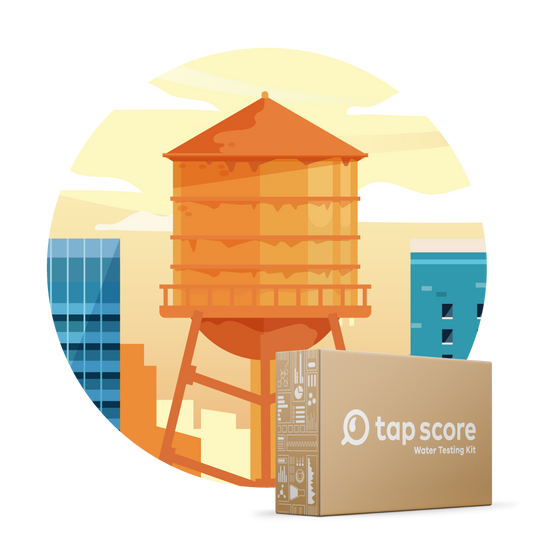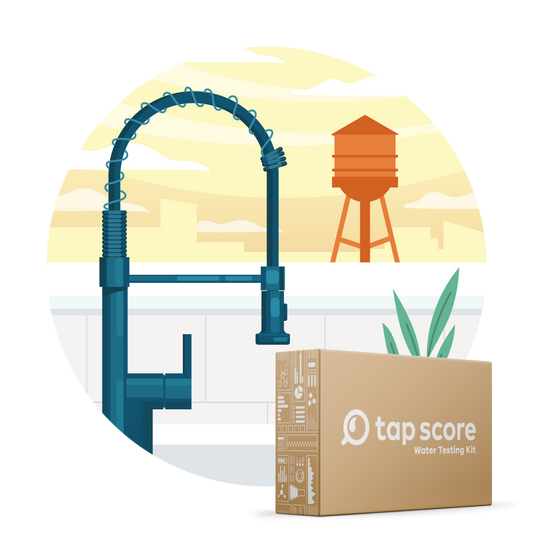
Where Can I Get My Water Tested?
Our blog is written by real experts— not AI. Each guide is carefully reviewed and updated based on the latest research. Plus, with no affiliate links, you can count on unbiased insights you can trust.
Interested in local drinking water analysis to be sure it’s safe for daily use? The only way to do so is by having it tested in a certified laboratory. But where do you find a lab that you can trust that meets your specific needs?
This guide explains where to find independent water testing near you, what kind of analysis to run, and how mail-to-lab test kits make the process easier.
Table of Contents:
- What Makes a Good Water Test?
- Water Testing Near Me
- Laboratory Water Testing Services Overview
- What's the Takeaway?
What Makes a Good Water Test?
Before the where, the what: A good water test is one that provides accurate and comprehensive information about your water quality. The best water test provides precise measurements of various parameters and contaminants such as:
- Heavy metals like lead and arsenic
- Nitrate and nitrite
- Coliform bacteria in well water
- VOCs in city water
- pH and hardness
- TDS and turbidity
Along with comprehensiveness and accuracy, you’ll want access to labs that are certified by regulatory bodies like the National Environmental Laboratory Accreditation Program (NELAP).
Another common reason people look for a local lab for water testing is because they think it’s the only way to get samples to the laboratory on time. A good water testing service should provide you with the necessary shipping materials for timely return of your samples to the lab.
Drinking Water Test Strips vs Laboratory Water Tests
While most DIY self-tests — including test strips — are cheap, they can be highly inaccurate. That’s because they’re limited by design:
Parameters like pH and free chlorine levels are simple enough to detect using strips. But mail-to-lab water tests utilize the expertise of the laboratory to analyze your sample for more complex contaminants with accuracy.
Color-changing strips in the highly variable environment of your home’s kitchen cannot compete with finely-tuned instrumentation and equipment handled by trained professionals in the controlled setting of a lab.

Concerned about troublesome contaminants — like PFAS, lead, chromium, microplastics, etc.? You’ll want a certified laboratory to do the work for you.
Is Well Water Testing Necessary?
Absolutely, private wells need regular testing and maintenance. If your water comes from a well, your water quality is your responsibility. If you're considering buying a property with a well, calling a well inspector to do a thorough inspection of your well is a good idea.
Once operational, we, along with the EPA, recommend testing your well at least once a year. Well owners will want to pay close attention to their coliform bacteria levels, nitrates, and heavy metals — like lead, arsenic, and chromium, which can be a natural part of the groundwater supply.
Water Testing Near Me
Local water utilities are a good place to start for customers of a public water system. Some utilities offer free water tests, but their tests are usually limited in scope. Still, local utilities tend to have a good understanding of the water concerns in your area and can be a good source of information.
Local water testing laboratories, on the other hand, don’t always have the ability to test for all the contaminants that may be a concern in your area. That’s because most labs are specialized. Additionally, their testing capabilities depend on factors like size and budget. Larger facilities, for example, tend to work exclusively with large clients.
Additionally, finding a certified water testing lab near you can be difficult because they’re not exactly common. Fewer than 2% of US cities actually have accredited facilities.
Take a look at this state-by-state guide to certified water labs. With direct links to information and databases, you can explore options closest to you.
Water quality testing companies like Tap Score, however, offer water direct-to-consumer water analysis kits that test your water sample for a variety of select contaminants through a laboratory. Be sure that your water test goes to an EPA certified lab.
What Does it Mean to Be an EPA-Certified Lab?
Although the EPA does not directly certify laboratories, laboratories are often certified by national and state organizations following various EPA methods for analysis. You can reference the Fields of Testing on a laboratories certificate of accreditation to see which specific methods they are certified for.
Tap Score Does the Work for You
Tap Score mail-to-lab tests are powered by SimpleLab — a certified laboratory testing network of over 200 accredited environmental testing facilities around North America. That means we take the where out of the equation — every laboratory in the Tap Score network is a water testing laboratory near you.
What Type of Laboratories (accredited or certified) Does the Tap Score Network Use?
Because accreditation and certification are essentially the same thing, Tap Score relies on both. All the labs in our network are certified and/or accredited.
With this network comes access to thousands of methods, certifications, and analytes without ever having to leave home or make dozens of phone calls. Along with access to this massive library of testing capabilities, drinking water analysis becomes more affordable and more streamlined because we do all the coordinating with labs (who aren’t exactly known for their customer service) for you.

Our core water testing kits are designed to analyze a wide variety of key contaminants all in one package and are specific to where you source your water — public utilities, private wells, rainwater, or from a spring, creek, or river.
Looking to test for something specific? Water testing for lead? PFAS? Microplastics? Radiologicals? Many of the contaminants getting attention in the media require specific equipment and testing procedures that many labs can’t handle. With access to our network, we match your sample with the appropriate labs.
Laboratory Water Testing Services Overview
You can find a water analysis lab near you that accepts water samples, or you can use a mail-in service like Tap Score that provides you with a water test kit and free shipping to you and to the lab.
How to Get Your Water Tested With a Laboratory Near You
Local Lab Water Testing
✅ Sometimes offer limited free testing
✅ Might know local risks
❌ Limited testing capacity
❌ Cumbersome drop-off process
❌ Difficult to understand results
❌ Can become very expensive very quickly
❌ No customer service
❌ No help with treatment solutions
Tap Score mail-to-lab water test kits
✅ Widest range of testing options along with a nationwide network of labs
✅ Convenient and easy (free to-and-return shipping included)
✅ Easy to understand results
✅ Free expert advice
✅ Non-affiliated treatment suggestions
Where Can I Get My Water Tested for Free?
Sometimes utilities or filtration companies offer free water tests. Like anything free, be sure to read the fine print.
Free laboratory water test kits
✅ Increased number of analytes tested
✅ Convenient and easy
❌ Might double as a sales tool for expensive filters
❌ Often difficult to understand results
❌ No customer service
Can I Get Water Quality Data from My Water Utility?
Every public water utility must report and make publicly available their cumulative water quality data for each year they provide water. These reports are called Consumer Confidence Reports (or CCRs) and can usually generally be found by using a search for “CCR” or “water quality” on your utility’s website. If your utility doesn’t have a website, it’s best to call them and ask for the latest CCR.
You can also consult Tap Score's City Water Project, which provides regional water quality information, to gain insight into geographical concerns around water quality. But it’s still no substitute to testing the water that flows out of your tap.
What’s the Takeaway?
- Between DIY water test strips and laboratory water analysis, labs offer you a significant increase in accuracy and comprehensiveness. DIY test strips are only good for simple parameters like pH and free chlorine levels.
- As a private well owner, a good water test will offer analysis of:
- Heavy metals (like lead, arsenic, chromium)
- Nitrate(s)
- Total coliform bacteria
- As a customer of a public water system or municipal utility, a good water test will offer analysis of:
- Heavy metals (like lead, chromium, iron, copper)
- Disinfection byproducts
- Volatile organic compounds (VOCs)
- All of the labs Tap Score works with are accredited/certified. That means their methods and standardized and regulating to ensure accurate results, no matter your location. Every lab is your certified local lab







